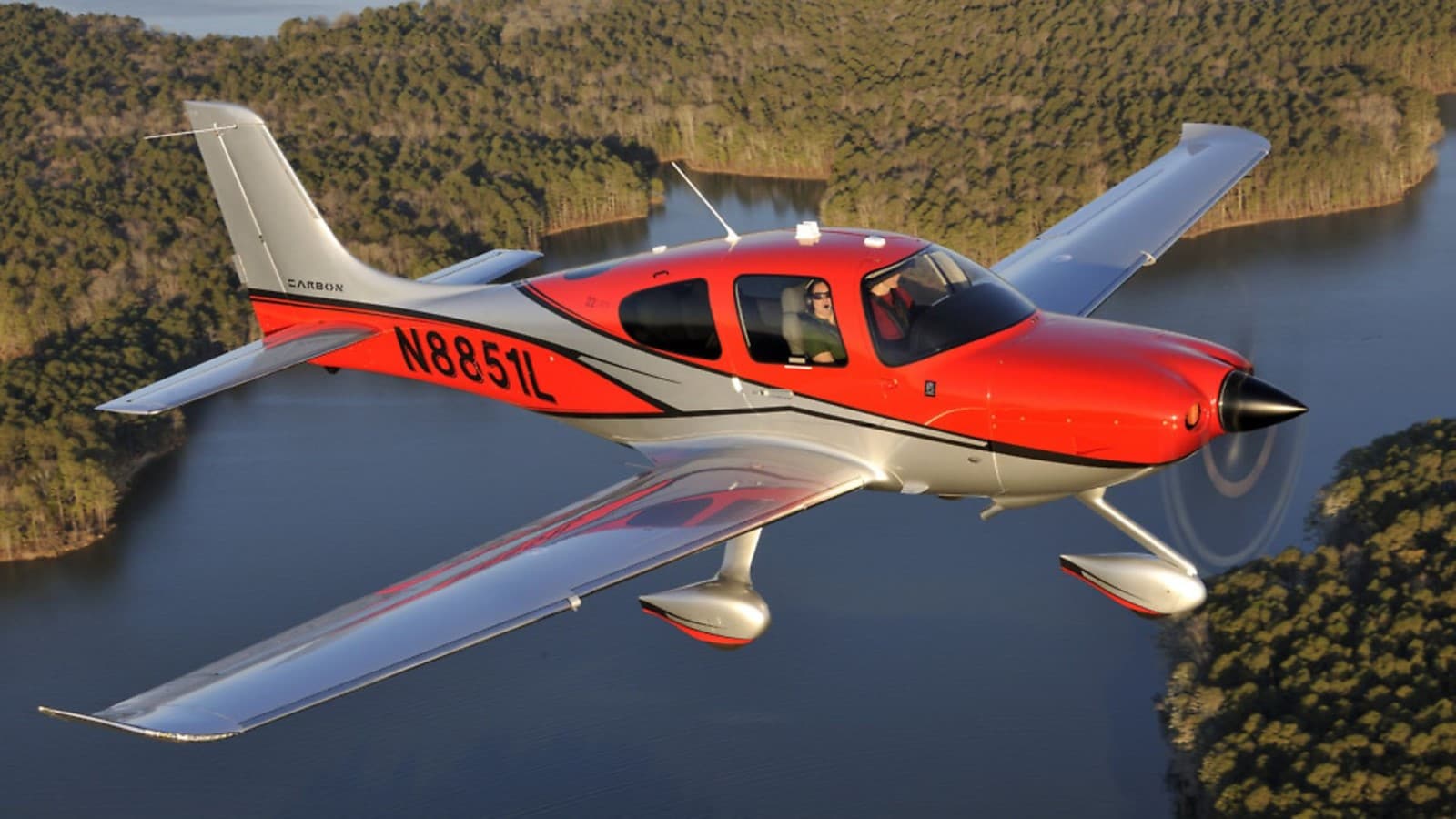CIRRUS SR-22
- Passengers 2
One of the most popular single-engine aircraft on the market, the four-seat Cirrus SR22 and its many variants broke new ground in the piston class.
About this aircraft
- The Cirrus SR22 received certification in 2000 and was first delivered in 2001.
- The cabin has two passenger seats behind the cockpit. A further passenger can be seated with a single pilot in the cockpit if the aircraft is owned, but not with a charter.
- The Cirrus SR22 is designed for short flights to regional airports, but some variants can complete popular routes like New York to Atlanta or London to Cannes.
- The Cirrus SR22’s external baggage hold has space for two medium soft suitcases.
With a stylish cabin and impressive range, the Cirrus SR22 is ideal for up to two passengers flying short to medium distances in privacy and comfort.
Interior design
The aircraft’s interior features two passenger seats in the rear. Newer models come with modern comforts like high-powered USB ports, premium leather seats, air conditioning, built-in oxygen and even the option for remote keyless entry.
Below is a typical configuration found on a Cirrus SR22.
Interesting facts to learn before you fly
- The SR22 was one of the first aircraft equipped with the Cirrus Airframe Parachute System (CAPS). This allows the pilot to deploy a parachute housed in the fuselage within a matter of seconds in an emergency, before the plane floats to the ground.
- On newer models, the baggage hold has a keyless remote-unlock door.
Technological features
The first Cirrus SR22 was powered by a nose-mounted 310 hp Continental IO-550-N piston engine, while one of the latest models, the Cirrus SR22 G5, has a 310 hp Continental IO-550-N six-cylinder horizontally opposed engine.
The original SR22 featured traditional analog instruments, with glass cockpit options available from 2003. Newer models have a Garmin-made Cirrus Perspective panel.
History
In the mid-1990s, Cirrus moved away from its successful line of kit planes to become a fully-fledged aircraft manufacturer. The resulting SR20 was first delivered in 1999, breaking ground as the first production general aviation aircraft with a parachute (debuting CAPS) and the first manufactured aircraft with all-composite construction, side-yoke flight controls and optional flat-panel avionics with dual 10- or 12-inch flight displays.
The faster SR22 debuted in 2001 with a nose-mounted Continental IO-550-N piston engine. It became the first aircraft of its type to offer fully-integrated flat-panel avionics (also known as a glass cockpit) as standard, when its analog flight instruments were replaced with the Avidyne Entegra primary flight display in 2003.
Cirrus made small improvements over the years, launching the SR22 G2 with reduced engine vibrations in 2004 and the turbocharged SR22 Turbo G2 with black leather seats in 2006. The SR22 G3 arrived in 2007 with a slew of changes, including a lighter wing that increased the aircraft’s range without compromising the fuel payload.
In 2009, Cirrus partnered with Garmin to develop a new glass cockpit, the Cirrus Perspective, which would come as standard on all future SR22s. The following year came an upgrade of the turbo model called the SR22T, which had a ground-boosted Continental TSIO-550-K engine for a greater cruise speed of 246 m/h. The final standard and turbo variants in the series, the Cirrus SR22 G5 and SR22T G5, debuted in 2013.
Manufacturer
Cirrus Design was founded in the early 1980s by three college friends, brothers Alan and Dale Klapmeier and Jeff Viken, in the basement of the Klapmeier family barn in Wisconsin. Their first project was the all-composite VK-30 kit plane, which was significantly larger than most other home-built aircraft on the market at the time.
The company relocated to a larger facility in Minnesota in 1994, before announcing plans to build a new factory at the Grand Forks International Airport in North Dakota in 1996. The VK-30 was discontinued as Cirrus started developing its first production-built aircraft. The Cirrus SR20 was type-certified in 1998 and deliveries began the following year.
The Cirrus SR22 followed in 2000 and a controlling stake in the company was sold to an international investment group for $100 million. After a successful few years, Cirrus hit financial strife and was saved from bankruptcy by China Aviation Industry General Aircraft, going on to release the hugely successful Vision SF50 jet in 2016.
Cost
Depending on factors like age and condition, the average price for a used Cirrus SR22 is approximately $280,000.
Charter rates
Charter rates for the Cirrus SR22 vary depending on the length of your journey and the airports you’re flying in and out of.
If you’d like to charter a Cirrus SR22, contact our team for a quote today. For information on other charter options, browse our list of available private aircraft.
Wet lease rates
ACMI (Aircraft, Crew, Maintenance, Insurance) wet lease rates for the Cirrus SR22 vary depending on the age of the aircraft, lease term length, number of guaranteed block hours and average cycle ratio. Contact us for a personalised quote.

